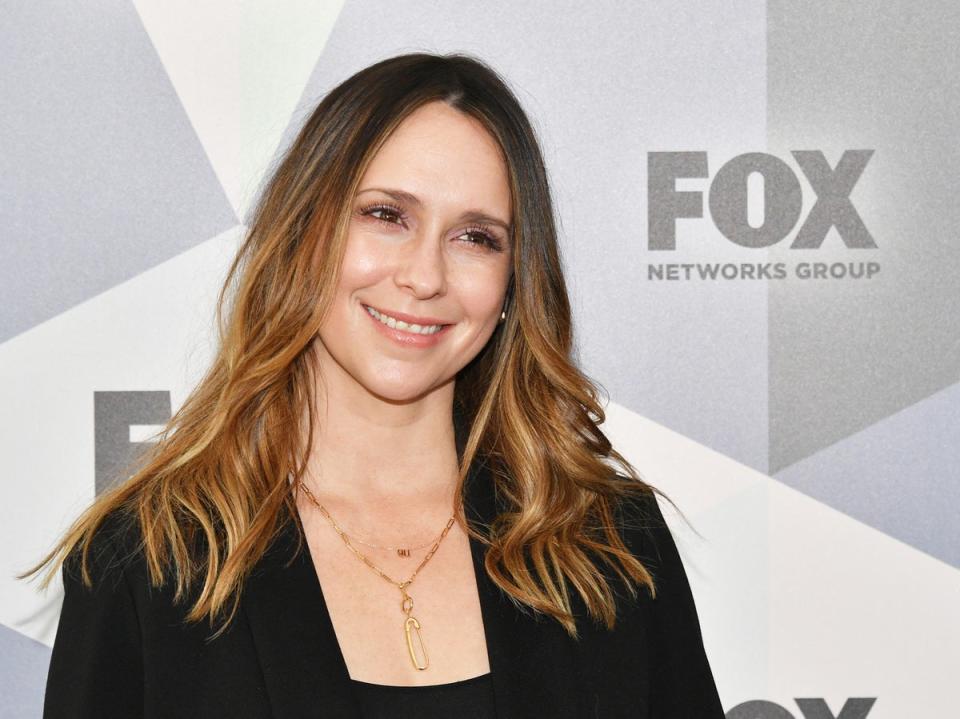Jennifer Love Hewitt Weight Transformation: Before And After Pictures
What is the significance of "jennifer love hewitt fat"?
Jennifer Love Hewitt's Fat refers to the public's scrutiny and media attention surrounding the actress's weight fluctuations throughout her career. Despite her success and talent, Hewitt has often been subjected to body-shaming and criticism for her size.
This scrutiny has highlighted the societal pressures and unrealistic beauty standards that women face, particularly in the entertainment industry. It has also sparked important conversations about body positivity, self-acceptance, and the need for a more inclusive representation of women's bodies in the media.
Hewitt's experiences have resonated with many women who have faced similar struggles with body image. Her journey towards self-acceptance and body neutrality has inspired others to embrace their own bodies and challenge societal norms.
The term "jennifer love hewitt fat" has become a symbol of the ongoing fight against body-shaming and the promotion of a more diverse and inclusive representation of women in the media.
Jennifer Love Hewitt's Fat
The scrutiny of Jennifer Love Hewitt's weight has highlighted important aspects related to body image, media representation, and societal pressures. Here are seven key aspects to consider:
- Body Shaming: The public criticism and ridicule of Hewitt's weight.
- Media Objectification: The portrayal of Hewitt's body as a commodity for public consumption.
- Unrealistic Beauty Standards: The pressure on women to conform to narrow and often unattainable beauty ideals.
- Body Positivity: The movement to challenge unrealistic beauty standards and promote acceptance of all body types.
- Self-Acceptance: Hewitt's journey towards embracing her own body and challenging societal norms.
- Media Representation: The need for more diverse and inclusive representation of women's bodies in the media.
- Cultural Impact: The broader implications of body-shaming and the promotion of unrealistic beauty standards on society.
These aspects are interconnected and reflect the complex relationship between body image, media, and society. Hewitt's experiences have sparked important conversations about the need to challenge body-shaming, promote body positivity, and create a more inclusive media landscape.
| Name | Date of Birth | Birth Place |
|---|---|---|
| Jennifer Love Hewitt | February 21, 1979 | Waco, Texas, U.S. |
Body Shaming
The public's criticism and ridicule of Jennifer Love Hewitt's weight is a prime example of body shaming, a pervasive issue that affects individuals of all genders, ages, and backgrounds.
- Objectification: Hewitt's body has been objectified and scrutinized in the media, reducing her to her physical appearance rather than valuing her talents and accomplishments.
- Comparison and Criticism: Hewitt's weight has been compared to unrealistic beauty standards, leading to criticism and negative comments about her body.
- Fatphobia: The stigma surrounding fatness has contributed to the body shaming Hewitt has faced. Fatphobic attitudes view fatness as inherently negative and undesirable.
- Impact on Mental Health: Body shaming can have a significant impact on mental health, leading to low self-esteem, eating disorders, and depression.
Body shaming is a harmful practice that perpetuates unrealistic beauty standards and contributes to a culture of body dissatisfaction. Hewitt's experiences highlight the importance of challenging body-shaming, promoting body positivity, and creating a more inclusive society where all bodies are valued and respected.
Media Objectification
The media's portrayal of Jennifer Love Hewitt's body as a commodity for public consumption is a significant aspect of the "jennifer love hewitt fat" phenomenon. This objectification has contributed to the scrutiny and criticism she has faced regarding her weight.
The media often presents unrealistic and narrow beauty standards, which can lead to the objectification of women's bodies. In Hewitt's case, her body has been scrutinized and commodified, reducing her to her physical appearance rather than valuing her talents and accomplishments.
This objectification has negative consequences for both Hewitt and other women who are subjected to similar treatment. It reinforces the idea that women's worth is primarily based on their physical appearance, perpetuating unrealistic beauty standards and contributing to a culture of body dissatisfaction.
Understanding the connection between media objectification and the scrutiny of Hewitt's weight is crucial for recognizing the harmful effects of body-shaming and promoting body positivity. It highlights the need for media literacy and critical consumption of media messages to challenge unrealistic beauty standards and promote a more inclusive representation of women's bodies.
Unrealistic Beauty Standards
The pressure on women to conform to narrow and often unattainable beauty ideals is a significant factor in the scrutiny and criticism that Jennifer Love Hewitt has faced regarding her weight. These unrealistic beauty standards, perpetuated by the media and society, create a culture where women's worth is often tied to their physical appearance.
In Hewitt's case, her body has been subjected to intense scrutiny and criticism because it does not conform to these narrow beauty ideals. This pressure to conform to unrealistic beauty standards has contributed to the body shaming and fatphobia that Hewitt has experienced.
Understanding the connection between unrealistic beauty standards and the scrutiny of Hewitt's weight is crucial for recognizing the harmful effects of body-shaming and promoting body positivity. It highlights the need to challenge these unrealistic beauty standards and promote a more inclusive representation of women's bodies in the media and society.
Body Positivity
The body positivity movement is a social movement that seeks to challenge unrealistic beauty standards and promote the acceptance of all body types. This movement has gained traction in recent years, as more and more people have become aware of the harmful effects that body shaming and fatphobia can have on individuals and society as a whole.
- Embracing Diversity: Body positivity promotes the idea that beauty comes in all shapes and sizes. It challenges the narrow beauty standards that are often portrayed in the media and celebrates the diversity of human bodies.
- Challenging Fatphobia: Body positivity actively challenges the stigma and discrimination associated with fatness. It promotes the idea that fat people are just as worthy of respect and dignity as people of any other size.
- Promoting Self-Acceptance: Body positivity encourages individuals to accept and love their bodies, regardless of their size or shape. It promotes self-care and self-compassion, and challenges the idea that self-worth is tied to physical appearance.
- Media Representation: Body positivity advocates for more diverse and inclusive representation of body types in the media. This includes challenging the over-representation of thin, white, cisgender women and promoting the visibility of people of all sizes, races, genders, and abilities.
The body positivity movement has had a significant impact on the way that people view their bodies and the way that they are treated by others. It has helped to raise awareness of the harmful effects of body shaming and fatphobia, and it has encouraged people to embrace their own bodies and challenge unrealistic beauty standards.
Self-Acceptance
The connection between "Self-Acceptance: Hewitt's journey towards embracing her own body and challenging societal norms" and "jennifer love hewitt fat" is significant, as Hewitt's personal experiences with body image and weight fluctuations have shaped her perspective and inspired her to advocate for body positivity.
Hewitt's journey towards self-acceptance began after years of facing public scrutiny and criticism for her weight. The relentless body-shaming she endured took a toll on her mental health and self-esteem. However, instead of conforming to societal beauty standards, Hewitt chose to challenge them and embrace her own body.
Hewitt's decision to prioritize self-acceptance has been an inspiration to many who struggle with body image issues. Her journey has demonstrated the importance of self-love, self-care, and challenging unrealistic beauty standards. By sharing her experiences, Hewitt has helped to raise awareness about the harmful effects of body-shaming and has empowered others to embrace their own bodies.
The practical significance of understanding the connection between "Self-Acceptance: Hewitt's journey towards embracing her own body and challenging societal norms" and "jennifer love hewitt fat" lies in its potential to promote body positivity and reduce body-shaming. By recognizing the importance of self-acceptance and challenging societal beauty standards, we can create a more inclusive and compassionate society where everyone feels valued and respected, regardless of their body size or shape.
Media Representation
The lack of diverse and inclusive representation of women's bodies in the media has been a contributing factor to the scrutiny and criticism that Jennifer Love Hewitt has faced regarding her weight. The media often perpetuates unrealistic and narrow beauty standards, which can lead to the objectification and commodification of women's bodies.
- Impact on Body Image: The media's portrayal of women's bodies can have a significant impact on how women view and value their own bodies. When women are constantly exposed to images of thin, white, cisgender women, they may start to internalize these images as the ideal and strive to achieve them, leading to body dissatisfaction and eating disorders.
- Objectification and Commodification: The media often presents women's bodies as objects to be consumed and judged, rather than as complex and multifaceted individuals. This objectification and commodification of women's bodies can contribute to body shaming and fatphobia.
- Lack of Diversity: The media's portrayal of women's bodies is often narrow and lacks diversity. Women of color, plus-size women, transgender women, and women with disabilities are often underrepresented or misrepresented in the media, which can lead to these women feeling invisible and undervalued.
- Challenge Societal Norms: By promoting more diverse and inclusive representation of women's bodies in the media, we can challenge societal norms and beauty standards that contribute to body-shaming and fatphobia.
Promoting diverse and inclusive representation of women's bodies in the media is essential for creating a more equitable and just society where all women feel valued and respected, regardless of their body size or shape.
Cultural Impact
The cultural impact of body-shaming and the promotion of unrealistic beauty standards extends beyond individual experiences, shaping societal norms and values. In the case of "jennifer love hewitt fat," this cultural impact is evident in:
- Perpetuation of Weight Stigma: Body-shaming and unrealistic beauty standards reinforce the idea that fatness is inherently negative and undesirable, leading to weight stigma and discrimination against overweight and obese individuals.
- Negative Body Image: The constant exposure to idealized bodies in the media can contribute to negative body image and body dissatisfaction, particularly among women and girls.
- Eating Disorders: Unrealistic beauty standards and body-shaming can trigger or exacerbate eating disorders, such as anorexia nervosa and bulimia nervosa.
- Mental Health Issues: Body-shaming and negative body image have been linked to mental health issues, including depression, anxiety, and low self-esteem.
Addressing the cultural impact of body-shaming and unrealistic beauty standards requires a multifaceted approach that includes media literacy, body positivity initiatives, and policy changes to promote inclusivity and challenge societal norms that perpetuate weight stigma and body dissatisfaction.
FAQs on "jennifer love hewitt fat"
This section aims to address frequently asked questions and clear up misconceptions surrounding the topic of "jennifer love hewitt fat." It presents concise and informative answers to common queries, providing a deeper understanding of the issue and its implications.
Question 1: What is the significance of "jennifer love hewitt fat"?
Answer: The term "jennifer love hewitt fat" highlights the societal pressures and scrutiny faced by women regarding their bodies, particularly in the entertainment industry. It has sparked discussions on body positivity, self-acceptance, and the need for diverse representation in the media.
Question 2: How does body-shaming impact individuals?
Answer: Body-shaming can lead to negative body image, eating disorders, and mental health issues such as depression and anxiety.
Question 3: What is the role of the media in perpetuating unrealistic beauty standards?
Answer: The media often presents narrow and idealized body types, reinforcing unrealistic beauty standards and contributing to body dissatisfaction.
Question 4: How can we promote body positivity and challenge weight stigma?
Answer: Promoting body positivity involves fostering self-acceptance, challenging societal norms, and advocating for diverse representation in the media and beyond.
Question 5: What are the broader societal implications of body-shaming?
Answer: Body-shaming perpetuates weight stigma, negatively impacts mental health, and reinforces harmful societal norms that prioritize thinness and physical appearance over well-being.
Question 6: How can we create a more inclusive society that values all body types?
Answer: Creating an inclusive society requires challenging societal norms, promoting media representation that reflects the diversity of human bodies, and fostering a culture of respect and acceptance.
Summary: Understanding the implications of "jennifer love hewitt fat" is crucial for promoting body positivity, challenging unrealistic beauty standards, and creating a more inclusive society that embraces and values all body types.
Transition: The following section explores the journey of self-acceptance and the importance of media representation in shaping body image and societal norms.
Conclusion
The exploration of "jennifer love hewitt fat" has highlighted the pervasive issue of body-shaming, unrealistic beauty standards, and the importance of body positivity. Jennifer Love Hewitt's experiences have sparked crucial conversations about the need to challenge societal norms, promote self-acceptance, and create a more inclusive media landscape.
To foster a truly equitable and just society, we must continue to challenge weight stigma, promote diverse representation, and cultivate a culture of respect and acceptance for all body types. By embracing body positivity, we empower individuals to prioritize their well-being and challenge the harmful narratives that perpetuate body-shaming and discrimination.



Detail Author:
- Name : Kavon Mante
- Username : schumm.kathryne
- Email : unienow@roob.net
- Birthdate : 2000-08-13
- Address : 22251 Jay Brooks Edwardomouth, TN 71838-9620
- Phone : +1-262-487-6793
- Company : Predovic-Schinner
- Job : Architect
- Bio : Iste iure quos sunt at mollitia. Laboriosam sapiente alias autem quae voluptates velit odio. Eos sit quam nostrum quasi maiores. Velit ad minima et nihil veniam sint exercitationem.
Socials
tiktok:
- url : https://tiktok.com/@raynork
- username : raynork
- bio : Aut velit enim temporibus reiciendis fugiat. Et ex quis sunt magni tempore id.
- followers : 5388
- following : 65
instagram:
- url : https://instagram.com/khalid_raynor
- username : khalid_raynor
- bio : Voluptatibus eum sequi fugiat mollitia. Praesentium quia minus dolor est.
- followers : 438
- following : 2012